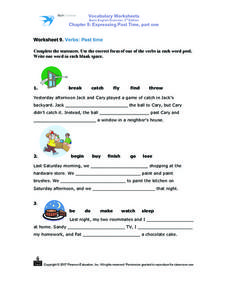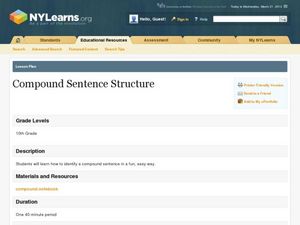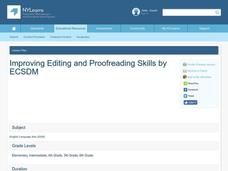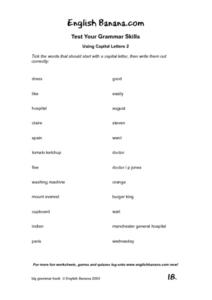British Council
Macbeth
Double the fun of studying Shakespeare with an interactive that introduces English learners to Macbeth. After watching a short, animated video that presents key elements of the plot, class members complete a worksheet identifying the...
Book Units Teacher
Skill Lessons – Prefixes and Suffixes
Sometimes the best way to understand a concept is to break it down. Young vocabulary pupils work with word parts in a hands-on activity that prompts them to connect flash cards with affixes to their root and base words. Additionally,...
Houghton Mifflin Harcourt
Finding Subjects and Predicates
Diagramming sentences has never been easier. Four worksheets feature exercises on simple subject and predicates, complete subjects and predicates, as well as compound verbs. Kids indicate the parts of the sentences with circles and...
Curated OER
Practice Test: Grammar
In this language arts worksheet, students find grammatical errors in 20 sentences. Students find the error and write each sentences correctly. No line is provided to write on.
Curated OER
Really Useful List of 100 Plural Nouns in English
For this language arts worksheet, students analyze a list of 100 nouns which do not follow the usual rule of adding an -s to make a plural. Students fill in the blanks of the chart and make irregular plurals. Example: tooth (teeth).
Curated OER
Adjectives- Group 1-- Comparative And Superlative Forms --Tough Version
For this language arts worksheet, students analyze 40 adjectives and generate the comparative and superlative forms to fill out this chart. Example: rough (rougher, roughest)
Curated OER
Vocabulary Worksheets Basic Grammar 3rd Edition Chapter 8: Expressing Past Times Part One
In this past tense verbs worksheet, students fill in 11 blanks by using the correct form of one of the verbs in each word pool. There are three paragraphs to complete.
Curated OER
Compound Sentence Structure
SMART boards a great way to create interest in any subject - even grammar! Using the provided SMART board lesson, have your 10th graders come up to the board and combine two independent clauses using a "glue" word (coordinating...
Curated OER
What's Happening?
Pupils participate in a grammar game. They identify verbs, adverbs and phrases. They complete a quiz at the end of the lesson to determine how much practice they still need.
Curated OER
Mistakes That English Native Speakers Make 3
In this grammar worksheet, students analyze 20 sentences and mark the one error in each. Students look for errors in grammar, punctuation, spelling or writing style. This page is intended for ESL adults, but is usable for proofreading...
Core Knowledge Foundation
Greek And Latin Root Words
Students examine Greek and Latin root words. They research the history of the English language, solve word games and puzzles, write paragraphs about the impact of Greek and Latin on the English language, and create flip chart study guides.
Curated OER
Using Apostrophes
For this interactive grammar worksheet, students choose the correct way to use apostrophes in each of the seven sentences.
Curated OER
Commas--Let's Separate Things
In this grammar worksheet, 2nd graders insert commas into each of the 13 sentences. This worksheet is on a second grade reading level.
Curated OER
Moving With Your Roots
Students dissect common words to study the origins of those words. In this language arts lesson, students study the Greek and Latin roots found in many words within English language. Students use dictionaries to fill out worksheets...
Curated OER
Improving Editing and Proofreading Skills
Students explore language arts by correcting grammatical errors. In this proofreading lesson, students identify the importance of editing their own writing and demonstrate their proofreading abilities by correcting several incorrect...
Curated OER
Question Forms Using Verb "to do" as an Auxiliary Verb (Present Simple Tense) 3
In this language arts learning exercise, students analyze 10 sentences which have the words in scrambled order. Students rearrange the words to make a question using the verb "to do." Example: you do OK feel (Do you feel OK?)
Curated OER
Question Forms Using Verb "to do" as an Auxiliary Verb (Present Simple Tense) 1
In this language arts activity, learners examine 10 sentences which are scrambled. Students rearrange the words to make each question correct, using the verb form of "to do." Example: do you how do (How do you do?)
Curated OER
Question Forms Using Verb "to have" as an Auxiliary Verb (Present Perfect Tense) 2
In this language arts worksheet, students examine 10 scrambled sentences. Students rearrange the words to make a questions using verb "to have" as an auxiliary verb in the present perfect tense. Example: you her have before been (Have...
Curated OER
Question Forms Using Verb "to have" as an Auxiliary Verb (Present Perfect Tense) 3
For this language arts worksheet, learners examine 10 sentences which are scrambled. Students rearrange the words in each sentence to make a question using verb "to have" as an auxiliary verb in the present perfect tense. Example: when...
Curated OER
Using Capital Letters 2
In this language arts worksheet, students examine a list of 30 mixed common and proper nouns. Students indicate which words should be capitalized and write them out correctly.
Curated OER
Using Capital Letters 1
In this language arts worksheet, learners analyze a list of 30 mixed common and proper nouns. Students mark which words should start with a capital letter and write them out correctly.
Curated OER
Conjugate a Verb Today! (Negative)
In this grammar skills learning exercise, students practice conjugating verbs in the negative form. Students complete three sets of present, past, and future forms.
Curated OER
Word Jeopardy
Quiz students on common spelling themes in a Jeopardy Game format. Students will answer 26 phrases with the proper question. Topics covered range from alphabetical order to rhyming, and choosing the best ending.
Curated OER
"Wh--" Questions
In this language arts worksheet, students learn the proper use of the question words: what, where, when, who and why. Students read the clues, then complete each sentence, beginning each on with the correct question word.

























